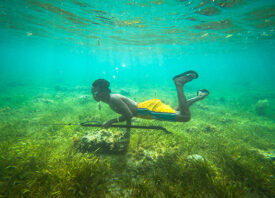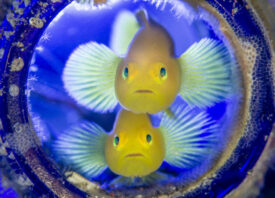Search this site
The Looming Threat of Octopus Factory Farming

The facility and its tour guides claim to be researching octopus breeding for conservation purposes and sell tour tickets to tourists to fund this work. The investigation documented wild-caught Hawaiian day octopuses confined in small, barren tanks with just a small cave to hide in and a toy or two for enrichment.
Using State of Hawaii resources, including land and access to deep sea water, Kanaloa Octopus Farm has captured and attempted to breed hundreds of octopuses, a process that always ends in death for both male and female animals. At the time of the investigation, Kanaloa Octopus Farm had only succeeded in raising octopus to 13 days of age in captivity because of the complexities of the species.
As described on their website, the intention of this aquaculture research facility is to develop technologies for octopus aquaculture and to be able to supply octopuses to zoos and aquariums. The investigation also revealed that the facility has long hoped to provide octopuses to the restaurant industry on the islands and has already engaged in commercial production of bobtail squids. © Laura Lee Cascada / The Every Animal Project / We Animals Media
During her one-hour tour at Kanaloa Octopus Farm in Hawaii, the photographer, writer, and activist Laura Lee Cascada saw octopuses attempting—over and over—to escape their tanks, one after the other. “The tour guide patrolled the enclosures to throw their arms back in, admitting that one had escaped days prior,” she tells me.
Other octopuses were only partially visible, hiding in a small rock cave as the crowds of tourists rushed by and reached into their tanks. It was the only shelter the animals had been given.
Kanaloa Octopus Farm* marketed itself as a kind of “octopus petting zoo.” The farm also conducted breeding experiments—a process that is always fatal for the mothers and results in high mortality for the babies. Cascada simply bought a ticket online and went on a tour to see what was happening behind the scenes.
Cascada has been investigating factory farming for about fifteen years now. She’s seen firsthand the suffering of animals farmed for meat, including horrific physical abuse through genetic mutilation, the cutting of beaks and tails, and forced impregnation. But that day at the octopus farm, she saw what she can only describe as “psychological agony.”
Octopuses are incredibly intelligent creatures, known for their cognitive complexity. Their legs can touch and taste their surroundings independently of their brains; meanwhile, their brains are capable of recognizing people and learning through play.
But these complex and mysterious animals are now facing a new and dire threat, beyond the scope of this Hawaii “petting zoo”: factory farming. Over in the Canary Islands, a Spanish corporation is trying to establish the world’s first octopus farm, despite the fact that so far, attempts at breeding octopuses have resulted in issues relating to cannibalism and self-mutilation as well as high mortalities.
The factory farming of octopuses would also be an environmental disaster; as Cascada explains, octopuses need to eat two to three times their weight, and they are carnivores, meaning that an octopus farm would put significant pressure on other fisheries and contribute to existing food scarcity issues.
As she watched octopuses at Kanaloa in Hawaii attempting to escape from their enclosures, only to have their arms thrown back inside, the activist thought about what factory farming would mean for the hundreds of thousands of octopuses who would be held in inhumane, unsuitable conditions before they were killed to for their meat. There’s still time to stop this industry from moving forward, but we need to act fast.
*Earlier this year, the octopus program at Kanaloa was temporarily shut down. Further information about allegations concerning the cruel treatment of the octopuses behind the scenes has since come to light as well. The future remains uncertain.


How did you first learn about Kanaloa Octopus Farm and what was happening there?
“My parents live on the Big Island of Hawaii, and I spend a lot of time there. I stumbled upon Kanaloa Octopus Farm when looking for activities to do near Kona and was shocked at how it was portraying itself as a friendly octopus petting zoo with sustainable marketing language all over its website and in the media.
“The octopus farming issue had been growing in the public dialogue at the time, so I was already aware that there is an octopus factory farm being developed in the Canary Islands—and knew I needed to look more into this one to make sure we didn’t go down that road in the U.S. too.”

How did you discover that everything was not as it seemed—that is, that they were not the ethical “conservation” organization that they marketed themselves to be?
“I’ve worked a lot on exposing greenwashing and humanewashing throughout my career, so a bunch of red flags went up for me when I saw that the website was framed around sustainability, yet it was clear that octopuses were wild-caught and being bred in experiments for potential farming.
“During my tour, I pressed the tour guide to elaborate on their goals, and that is when she told me that they have someone called an ‘octopus whisperer’ who catches octopuses for them, and that their research could be used to help other countries develop octopus farming for meat.”


What makes octopuses unique? And relatedly, why is it so harmful for them to be kept in captivity?
“Octopuses are psychologically complex beings who form intricate social networks and hierarchies—in the ocean, males even box each other over territory. They use mirrors, and they can plot their way out of enclosures to go upstairs or even back to the sea.
“Their needs simply cannot be met inside small barren tanks. But if Hawaii allows Kanaloa to reopen, the facility’s ‘research’ could help create a Hawaiian day octopus aquaculture industry, mirroring the impending factory farm in the Canary Islands, which intends to slaughter nearly 300,000 octopuses per year.”


Can you tell us a bit about the octopus farming industry in general?
“In the case of cephalopods like octopuses and squids, any confined farm is a factory farm when compared with the vast ocean. Kanaloa is already quietly breeding and selling bobtail squids to restaurants. And if Kanaloa ever provided its octopus research to aquaculture facilities, we could see massive day octopus farms crop up worldwide, just like the Canary Islands common octopus farm—contributing to the deaths of millions of octopuses. Kanaloa is playing a dangerous role in this budding new industry while attempting to escape criticism as an innocent messenger.”

Do you have any updates on the commercial farm in the Canary Islands? What about Kanaloa Octopus Farm?
“Right now, activists are still working on stopping the permits from being granted in the Canary Islands, so the fight is still ongoing. Kanaloa has not yet received permits to reopen, but I am working on FOIA requests to keep tabs on the process and find out if they are granted these permits. As of right now, though, they have switched to breeding and selling bobtail squids, which don’t require the same permits. This is equally as devastating as octopus farming, since squids are so similar in complexity and sentience.”


What can be done to stop the octopus farming industry?
“People can write to the Hawaii Division of Aquatic Resources to urge them to keep Kanaloa closed. More details can be found on my blog’s investigation page. They can also replicate the work that activists are doing in Washington state, where an octopus farming ban is working its way through the legislature, by urging their own elected officials to introduce such a bill.”


Much of Laura Lee Cascada’s work on behalf of animals is represented by We Animals Media, a leading group of animal photojournalists and filmmakers documenting exploitation around the world. Support their work here.
Further reading:
• A Photojournalist Teaches Us How to Make the World Better for Animals
• These Photos Are Painful, But We All Need to See Them



